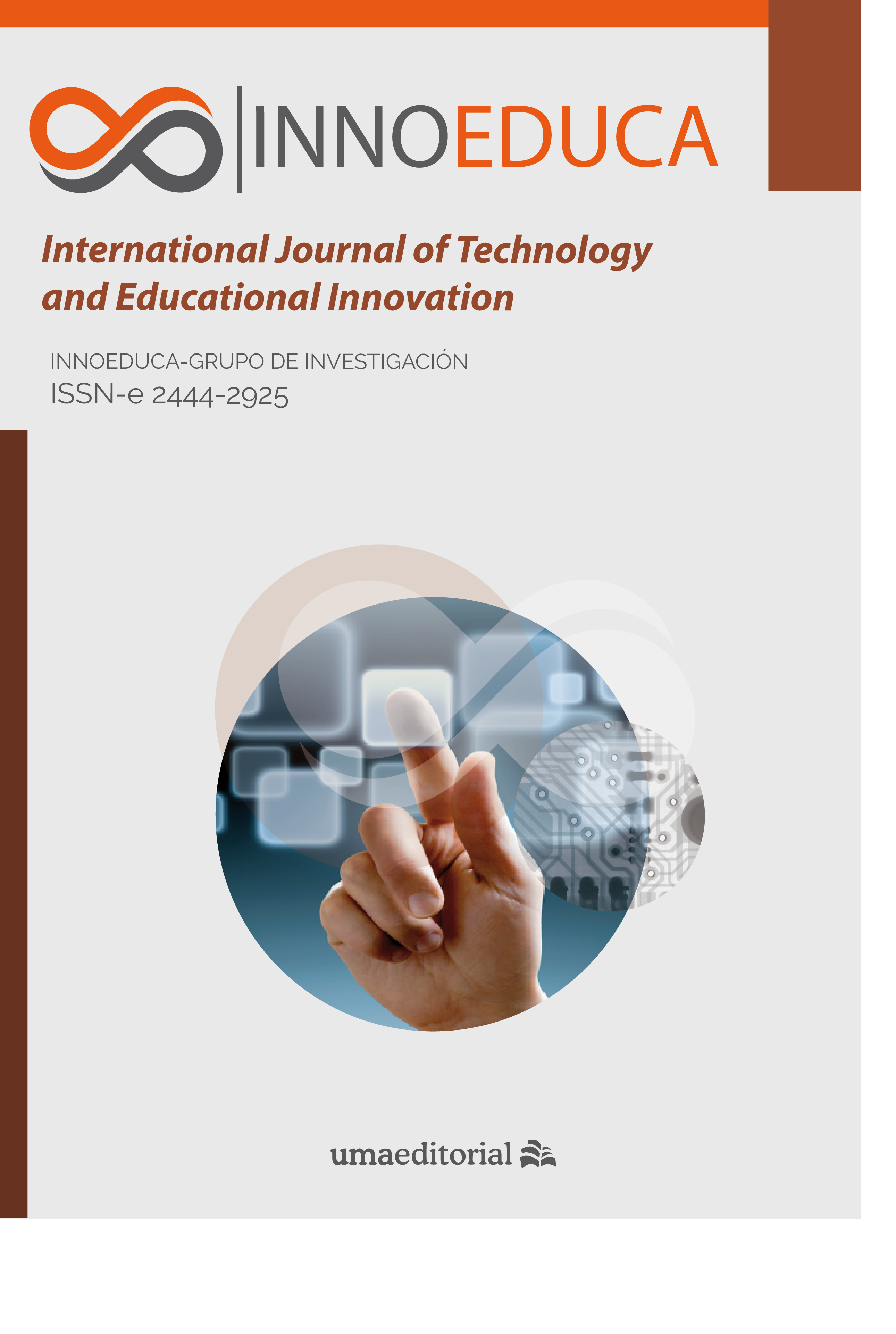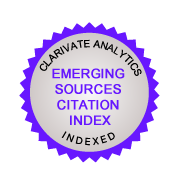Active methodologies and knowledge management to promote creativity and innovation in the classroom
DOI:
https://doi.org/10.24310/innoeduca.2021.v7i1.9887Keywords:
Knowledge management, creativity, active methodologies, perception of studentsAbstract
Knowledge management is a concept that originated and frequently applied in the business environment, associated with the stimulation of creativity and innovative ideas to increase competitiveness. However, it is possible to use its guiding ideas in other areas, where creativity and innovation, the generation of new knowledge and the implementation of methods to make them explicit and manage them in educational organizations are also relevant.
This work presents the pedagogical proposal of a university subject and investigates the perception that students have about the training process developed in it, in particular if they believe that innovation and the generation of knowledge have been promoted in view of their future contribution to society. The survey has been carried out through a survey applied at the end of the school year.
Administration II is a subject located at the end of the Basic Cycle of the Faculty, which has a duration of 2 years. It receives an average of 800 students each year, belonging to all the courses that are taught. The proposal is based on the design and implementation of simulation dynamics to analyze the environment of an organization, role-playing games to interpret what a manager does, problem solving related to the Sustainable Development Goals (SDG), simulation of the operation of an industry to work on the impact of corporate social responsibility, discussion in small groups to analyze decision-making in the context of certainty, risk or uncertainty, application of creativity techniques such as combinatorial matrices to develop new ideas, among others.
In order to comprehensively evaluate the chair proposal, it is relevant to know the opinions of the protagonists, the students, who can provide relevant feedback to learn about the transformations and experiences lived. The perception of students about their training process is different for Administration II compared to the other subjects studied. They have felt more motivated to be creative, both because of the teacher's encouragement, because of the activities carried out inside and outside the classroom, and because of the type of work and presentations requested. Likewise, tools and methods have been used that were considered original with respect to previous experiences. This is relevant if we consider that the majority of students believe that creative classes would favor their learning and that what they have learned will help them be innovative in their current or future work.
Downloads
Metrics
Publication Facts
Reviewer profiles N/A
Author statements
Indexed in
-
—
- Academic society
- N/A
- Publisher
- Universidad de Málaga
References
Aguerrondo, I. (2009). La escuela inteligente en el marco de la gestión del conocimiento. Innovación Educativa, 9(47), 33-43.
Angulo Rincón, R. (2017) Gestión del conocimiento y aprendizaje organizacional: una visión integral. Informes Psicológicos, 17(1), 53-70 http://dx.doi.org/10.18566/infpsic.v17n1a03
Aude Berizonce, M., Pérez, J., & D’arcángelo, F. (2019, agosto 29). Metodologías Activas en la Universidad. La experiencia de Administración II en la FCE [Conference presentation]. I Jornadas de Experiencias e Innovación en la enseñanza de las Ciencias Económicas, La Plata, Argentina.
Caballero García, P.Á., Sánchez Ruiz, S., & Belmonte Almagro, M.L. (2019). Análisis de la creatividad de los estudiantes universitarios. Diferencias por género, edad y elección de estudios. Educación XX1, 22(2), 213-234. https://doi.org/10.5944/educXX1.22552
Espejo, R., & Sarmiento, R. (2017). Metodologías activas para el aprendizaje. Universidad Central.
Fainholc, B. (2006). Rasgos de las universidades y de las organizaciones de educación superior para una sociedad del conocimiento, según la gestión del conocimiento. Revista de Universidad y Sociedad del conocimiento, 3(1), 1-10.
Farfán Buitrago, D., & Garzón Castrillón, M. (2006). La gestión del conocimiento. Documento de investigación, (29), 1-112.
Fernández March, A. (2006) Metodologías activas para la formación de competencias. Educatio Siglo XXI, 24, 35-56.
Latorre Cosculluela, C., Suárez Gálvez, C., Quiroga Gómez, S., & Sierra Sánchez V. (2019) Metodologías activas en Educación Superior para la formación de competencias del Siglo XXI. En Redine (Ed.), Edunovatic 2019 conference proceedings: 4th Virtual International Conference on Education, Innovation and ICT: 18-19 (pp. 593). Redine.
Martínez Martínez, A.; Cegarra Navarro, J., & Rubio Sánchez, J. (2012) Aprendizaje basado en competencias: una propuesta para la autoevaluación docente. Profesorado, 16(2), 373-386.
Morán-Barrios, J., Ruiz de Gauna, P., Ruiz Lázaro, P., & Calvo, R. (2020). Metodologías complementarias de aprendizaje para la adquisición de competencias en la formación de especialistas y actividades profesionales confiables. Educación Médica, 21(5), 328-337. https://doi.org/10.1016/j.edumed.2020.02.001
Nofal, N. (2007). La gestión del conocimiento como fuente de innovación. Revista Escuela de Administración de Negocios, (61), 97-102.
Nonaka, I., & Takeuchi, H (1995). The knowledge creating company. Oxford University Press.
Pérez-Montoro, P. (2016). Gestión del conocimiento: orígenes y evolución. El profesional de la información, 25(4), 526-534. http://dx.doi.org/10.3145/epi.2016.jul.02
Ordoñez de Pablos, P., & Parreño Fernández, J. (2005). Aprendizaje Organizativo y gestión del conocimiento: un análisis dinámico del conocimiento de la empresa. Revista Investigaciones Europeas de Dirección y Economía de la Empresa. 11(1), 165-177.
Rodriguez-Goméz, J., & Gairín Sallán, D. (2012). El modelo Accelera de creación y gestión del conocimiento en el ámbito educativo. Revista de Educación, (357), 633-646.
Rodriguez-Goméz, J., & Gairín Sallán, D. (2015). Innovación, aprendizaje organizativo y gestión del conocimiento en las instituciones educativas. Revista Educación, XXIV(46), 73-90.
Rojas Dávila, R., & Torres Briones, C. (2017) La gestión del conocimiento basado en la Teoría de Nonaka y Takeuchi. Innovar, 2(4), 30-37.
Sevilla Morales, J., & García Fernández, F. (2019). La innovación en los estudiantes de educación superior para la generación del conocimiento: Caso Universidad Autónoma de Tamaulipas. En M-L. Sánchez, M. Zerón y P. Hernández (Eds.), Tecnología e Innovación Empresarial. Compendio de aportaciones a las Ciencias Administrativas. (p. 127-157). Academia de Cs. Administrativas.
Sologuren, E., Núñez, C. & González, M. (2019). La implementación de metodologías activas de enseñanza-aprendizaje en educación superior para el desarrollo de las competencias genéricas de innovación y comunicación en los primeros años de Ingeniería. Cuaderno de Pedagogía Universitaria, 16(32), 19-34
Downloads
Published
How to Cite
Issue
Section
License
All contents published by Innoeduca. International Journal of Technology and Educational Innovation are subject to Creative Commons Attribution-Nocomercial-NoDerivatives 4.0 International License, whose complete text can be consulted at https://creativecommons.org/licenses/by-nc-nd/4.0/legalcode. Thus, copying, distribution, public communication, derivative works and commercial use of content are permitted as of the aforementioned issue provided that the source and the author of the text are cited.
It is the responsibility of the authors to obtain the necessary permits for images that are subject to copyright.

This work is licensed under a Creative Commons Attribution-NonCommercial-NoDerivatives 4.0 International License.













242.png)








